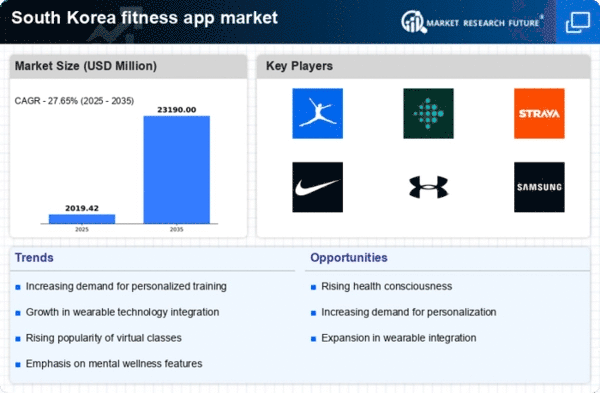Rising Health Consciousness Among Consumers
The growing health consciousness among South Korean consumers appears to be a driving force behind the fitness app market. As individuals become more aware of the importance of maintaining a healthy lifestyle, the demand for fitness-related solutions is likely to surge. Recent surveys indicate that approximately 60% of South Koreans actively seek ways to improve their physical fitness, which may translate into increased downloads and usage of fitness applications. This trend suggests that fitness apps offering personalized workout plans, nutrition tracking, and wellness resources could see substantial growth. Moreover, the fitness app market may experience diversification as consumers seek specialized applications catering to various fitness levels and preferences. This heightened awareness and demand for health-oriented solutions could potentially reshape the competitive landscape of the fitness app market.
Increased Focus on Data Privacy and Security
The heightened focus on data privacy and security is likely to influence the fitness app market in South Korea. As users become more aware of the potential risks associated with sharing personal health data, their expectations for robust security measures are increasing. Recent studies indicate that approximately 70% of consumers express concerns regarding data privacy in health-related applications. This trend suggests that fitness app developers must prioritize the implementation of stringent security protocols to build trust and credibility among users. By ensuring compliance with data protection regulations and offering transparent privacy policies, fitness apps may enhance user confidence and loyalty. Consequently, the fitness app market could witness a shift towards applications that not only provide fitness solutions but also prioritize user data protection, thereby fostering a more secure environment for health management.
Integration of Social Features in Fitness Apps
The integration of social features within fitness applications appears to be a crucial driver for the fitness app market. South Korean users increasingly value community engagement and social interaction as part of their fitness journeys. Features such as leaderboards, challenges, and social sharing capabilities may enhance user motivation and accountability. Recent data suggests that fitness apps with social components experience up to 40% higher user retention rates compared to those without. This trend indicates that fostering a sense of community can significantly impact user engagement. As the fitness app market continues to evolve, developers may prioritize the incorporation of social features to attract and retain users, thereby creating a more dynamic and interactive experience. This shift could lead to a more competitive environment, as apps that successfully leverage social connectivity may gain a distinct advantage.
Technological Advancements in Wearable Devices
The proliferation of wearable technology in South Korea appears to be a pivotal driver for the fitness app market. With devices such as smartwatches and fitness trackers gaining traction, users are increasingly integrating these tools into their fitness routines. In 2025, the wearable device market in South Korea is projected to reach approximately $2 billion, indicating a robust demand for fitness-related functionalities. This trend suggests that fitness apps that seamlessly connect with wearables may experience heightened user engagement and retention. Furthermore, the ability to track real-time data such as heart rate, calories burned, and activity levels enhances the overall user experience, thereby driving the growth of the fitness app market. As consumers become more health-conscious, the synergy between fitness apps and wearable technology is likely to strengthen, fostering innovation and competition within the industry.
Government Initiatives Promoting Health and Fitness
Government initiatives aimed at promoting health and fitness in South Korea are likely to serve as a significant catalyst for the fitness app market. Various public health campaigns encourage physical activity and healthy living, which may lead to increased adoption of fitness applications. For instance, the South Korean government has invested in programs that aim to reduce obesity rates, which have been reported at around 30% among adults. Such initiatives not only raise awareness but also create a conducive environment for fitness app developers to thrive. The fitness app market could benefit from partnerships with governmental bodies, potentially leading to funding opportunities and increased visibility. As these initiatives continue to evolve, they may further stimulate consumer interest in fitness apps, thereby enhancing market growth and sustainability.























Leave a Comment